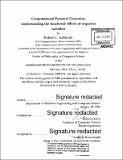Computational personal genomics : understanding the functional effects of sequence variation
Author(s)
Altshuler, Robert C. (Robert Charles)
DownloadFull printable version (14.20Mb)
Other Contributors
Massachusetts Institute of Technology. Department of Electrical Engineering and Computer Science.
Advisor
Manolis Kellis.
Terms of use
Metadata
Show full item recordAbstract
Understanding how variation in genome sequence leads to differences in gene regulation is a longstanding challenge that is essential to explaining the many phenotypic differences and complex diseases that are observed in humans. Sequencing-based functional genomics assays provide unique insight into this problem by allowing direct observation of differences between homologous chromosomes in, for example, gene expression, transcription factor binding, or chromatin state. In this thesis, we use data from the ENCODE project to conduct a unique examination of allele-specific activity jointly across many layers of regulation including chromatin structure and modifications, occupancy by transcription factors and RNA Polymerase II, and ultimately gene expression. We develop new computational approaches for (1) creating personal genomes; (2) facilitating their use in the analysis of sequenced reads; (3) detecting allele-specific activity; (4) identifying allelic differences in transcription factor binding motifs; and (5) jointly analyzing functional data to identify putative causal variants in eQTLs or GWAS loci. We show that these approaches improve upon existing methods. We observe that there are genome-wide correlations in allele-specific activity, and that allele-specific activity is widespread across the autosomes. We demonstrate that we can gain insights into gene regulation by combining the signals of allele-specific activity from multiple assays. By detecting variants that alter transcription factor binding we find that we can identify putative causal variants in eQTLs. We show that allele-specific activity is enriched at GWAS SNPs and eQTLs and propose how analysis of allele-specific activity in individuals could provide an alternate pathway to discovery of eQTLs or identification of causal variants in eQTLs or GWAS loci.
Description
Thesis: Ph. D., Massachusetts Institute of Technology, Department of Electrical Engineering and Computer Science, 2016. Cataloged from PDF version of thesis. Includes bibliographical references (pages 91-96).
Date issued
2016Department
Massachusetts Institute of Technology. Department of Electrical Engineering and Computer SciencePublisher
Massachusetts Institute of Technology
Keywords
Electrical Engineering and Computer Science.